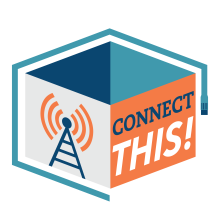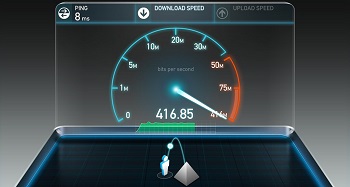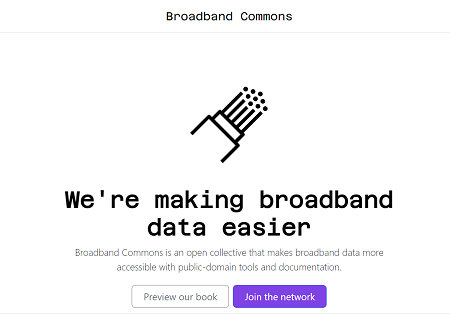
Fast, affordable Internet access for all.


May 2022 witnessed something remarkable: the birth of a new nonprofit advocacy organization whose sole purpose was to speak up for the hundreds of communities that have built municipal broadband networks, and the thousands more that want to but don't know where to start. Now, the American Association for Public Broadband has named as its Executive Director as Gigi Sohn, former Biden nominee to the Federal Communications Commission. And she's ready to get to work.
Gigi joins Christopher on the podcast this week to talk about standing up support systems to promote and defend community-driven models to double the number of municipal systems in the next five years - including providing resources and countering dark-money astroturf campaigns - while also making sure the Internet stays as open and equitable as possible, and not squandering the promise of BEAD.
This show is 46 minutes long and can be played on this page or via Apple Podcasts or the tool of your choice using this feed.
Transcript below.
We want your feedback and suggestions for the show-please e-mail us or leave a comment below.
Listen to other episodes here or view all episodes in our index. See other podcasts from the Institute for Local Self-Reliance here.
Thanks to Arne Huseby for the music. The song is Warm Duck Shuffle and is licensed under a Creative Commons Attribution (3.0) license.

Join us Tuesday, August 8th at 2pm ET for the latest episode of the Connect This! Show. Co-hosts Christopher Mitchell (ILSR) and Travis Carter (USI Fiber) will be joined by regular guests Doug Dawson (CCG Consulting) and Kim McKinley (UTOPIA Fiber) and special guest Robert Wack (Carroll County, Maryland Health Department) to talk about all the recent broadband news that's fit to print, including progress on the Westminster Fiber Network and what's looking like Anna Gomez's speedy confirmation to the FCC.
Email us at broadband@communitynets.org with feedback and ideas for the show.
Subscribe to the show using this feed or find it on the Connect This! page, and watch on LinkedIn, on YouTube Live, on Facebook live, or below.
In this week’s round-up of broadband news, we culled three stories we think are worth reading.
How Much is Fast Enough?
The first is a story from Ars Technica – FCC chair: Speed standard of 25Mbps down, 3Mbps up isn’t good enough anymore – written by veteran IT reporter Jon Brodkin.
For years now, broadband-for-all advocates have lamented the FCC’s minimum broadband speed standard of 25 Megabits per second (Mbps) download and 3 Mbps upload as being laughably antiquated. Indeed, it’s been almost three years since we made the case for Why 25/3 Broadband Is Not Sufficient, though it was outdated long before then.

But as Brodkin reported this week, the FCC’s minimum speed standard “could finally change under Chairwoman Jessica Rosenworcel, who is proposing a fixed broadband standard of 100Mbps downloads and 20Mbps uploads along with a goal of bringing affordable service at those speeds to all Americans.”
Under Rosenworcel’s plan, the FCC would look at availability, speeds, and prices to determine whether the agency should take regulatory actions under Section 706 of the Telecommunications Act, which requires the FCC to determine if high-speed Internet access is being deployed "on a reasonable and timely basis" to all Americans.

This week on the podcast, Christopher is joined by Christine Parker (Senior GIS Analyst at ILSR), and Meghan Grabill (Geospatial Analyst at the Maine Connectivity Authority) to talk about the recently announced NTIA location challenge process for the upcoming BEAD program. They talk about the handful of states that have been moving fast and already submitted (or will soon) their initial proposals, including Virginia and Louisiana and Maine, before tackling the recently released challenge process. Meghan and Christine run through the process by which states are allowed to set up different criteria for eligible BEAD locations, including everything from adjusting eligible technologies to location types, and how households can submit data and challenges.
Worthwhile revisions we like to see in the process include some shifting of the burden of proof to the IPSs (the largest one which have a long history of over-reporting service territory), the allowance of more flexible speed test data, and the ability to add community anchor institutions to grant-eligible maps.
This show is 36 minutes long and can be played on this page or via Apple Podcasts or the tool of your choice using this feed.
Transcript below.
We want your feedback and suggestions for the show-please e-mail us or leave a comment below.
Listen to other episodes here or view all episodes in our index. See other podcasts from the Institute for Local Self-Reliance here.
Thanks to Arne Huseby for the music. The song is Warm Duck Shuffle and is licensed under a Creative Commons Attribution (3.0) license.

Join us Tuesday, July 25th at 2pm ET for the latest episode of the Connect This! Show. Co-hosts Christopher Mitchell (ILSR) and Travis Carter (USI Fiber) will be joined by regular guests Doug Dawson (CCG Consulting) and Kim McKinley (UTOPIA Fiber) to talk about all the recent broadband news that's fit to print.
Email us at broadband@communitynets.org with feedback and ideas for the show.
Subscribe to the show using this feed or find it on the Connect This! page, and watch on LinkedIn, on YouTube Live, on Facebook live, or below.
Concerns are mounting that over $2.8 billion in potential broadband grants doled out by the Federal Communications Commission’s (FCC) Rural Digital Opportunity Fund (RDOF) could be wasted, further eroding the already well-criticized program’s disjointed effort to expand broadband access across rural America.
In 2019, the Ajit Pai FCC created the $20.4 billion RDOF with an eye on shoring up affordable broadband access in traditionally unserved rural U.S. markets. The money was to be doled out via reverse auction in several phases, with winners often declared based on having the maximum impact for minimum projected cost.
During phase one of the program, the FCC stated that 180 bidders won $9.2 billion over 10 years to provide broadband to 5.2 million locations across 49 states and the Commonwealth of the Northern Mariana Islands. But of the $9.2 billion in winners, over $2.8 billion has gone into default, meaning the bidder couldn’t actually deliver on promised projects.
We've tracked the RDOF awards since the auction concluded, including for the providers that defaulted on their wins.
These issues have not only imperiled RDOF program funding, but have thrown a wrench in the works of numerous additional government efforts to shore up broadband access, from the FCC’s long-criticized quest to accurately map U.S. broadband access, to the implementation of newer grant programs overseen by other agencies.

It's strange to see the FCC continually patting itself on the back for releasing a new national broadband map. Spend just a little bit of time with it, and the cracks and holes quickly show themselves. This week on the podcast, Christopher is joined by Christine Parker, Senior GIS Analyst at ILSR, and Alexis Schrubbe, Director of the Internet Equity Initiative at University of Chicago. They do a deep dive into the many, many problems that persist - from bad ISPs claiming service to locations where they have no presence, to missing locations, to the mountain of work the FCC has offloaded onto the rest of us in fixing a map that it paid a lot of money to assemble.
Christopher, Alexis, and Christine also untangle the ongoing challenge process for unserved, underserved, and served locations, and the timeline that states have in preparing to subgrant hundreds of millions in BEAD dollars starting in 2024. It's not all bad news - they end the show by talking about what state broadband offices, individuals, nonprofits, and others can do to band together, find good partners, and make sure their community gets counted in our national broadband service census.
This show is 38 minutes long and can be played on this page or via Apple Podcasts or the tool of your choice using this feed.
Transcript below.
We want your feedback and suggestions for the show-please e-mail us or leave a comment below.
Listen to other episodes here or view all episodes in our index. See other podcasts from the Institute for Local Self-Reliance here.
Thanks to Arne Huseby for the music. The song is Warm Duck Shuffle and is licensed under a Creative Commons Attribution (3.0) license.
*In partnership with Broadband Breakfast, we occasionally republish each other's content. The following story by Broadband Breakfast Reporter Teralyn Whipple was originally published here.
South Carolina’s innovative state broadband map can accurately identify areas of over-reporting by Internet service providers (ISPs), the director of the state’s broadband office said in a recent Ask Me Anything! session in the broadband community.
South Carolina processes the same data as does the Federal Communications Commission (FCC) as it creates its broadband map.
However, it also performs audits on the ISPs to ensure they are submitting accurate data. Hence, the state can determine errors in reporting data based on where the ISP’s networks had been deployed previously and where state investments have gone, said Jim Stritzinger, director of the state’s broadband office.
Providers are required to file amended returns with the FCC in the event that South Carolina’s state broadband office flags errors in their reporting information. Errors include misreporting of technology types.
If the reporting errors are not corrected, the state will report the defaulting ISP to the FCC, said Stritzinger, a software engineer with a passion for mapping broadband in the Palmetto state.
A big flaw of the FCC’s maps is that ISPs were able to report advertised speeds, which Stritzinger said were useless.

Join us Friday, May 26, at 2pm ET for the latest episode of the Connect This! Show. Co-hosts Christopher Mitchell (ILSR) and Travis Carter (USI Fiber) will be joined by regular guests Kim McKinley (UTOPIA Fiber) and Doug Dawson (CCG Consulting) to talk about all the recent broadband news that's fit to print. They'll chat about Gigapower, Anna Gomez' nomination to the FCC, and more.
Email us at broadband@communitynets.org with feedback and ideas for the show.
Subscribe to the show using this feed or find it on the Connect This! page, and watch on LinkedIn, on YouTube Live, on Facebook live, or below.
Finding good data on broadband is hard to come by. But, it’s about to get a bit easier with a new online resource being developed by an informal group known as Broadband Commons.
Broadband Commons is a group of folks from very different backgrounds – nonprofit, industry, and academic – who work in the broadband and digital equity space and have a shared enthusiasm for making sense of messy broadband data.
Their primary mission is to make broadband data (e.g., FCC Broadband Availability data and more) accessible to all, both in terms of understanding and using the data.

Broadband Commons (ILSR’s Community Broadband Networks Initiative counts itself as a member) is excited to share a peek into the development of their guidebook: Introducing Broadband Data. This book is intended to be the “missing manual” for broadband data users — how to find the data you need, how to wield it to answer your research questions, common gotchas to look out for, and how to share your work back with the community.
They invite interested folks to share any feedback you might have as this guidebook develops – what else might be needed? If you're interested in contributing your expertise by writing a particular section, please head over to the Broadband Commons website to check out the book and sign up for an invite to the discord channel.
Updates about the project will also be posted on the website.
Header image of data graphic courtesy of www.epictop10.com on Flickr, Attribution 2.0 Generic (CC BY 2.0)